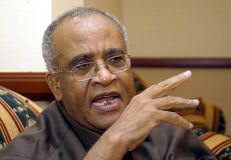AU mediator admits stagnation of Darfur peace talks
Oct 7, 2005 (ABUJA) — The African Union (AU) mediator in the Darfur conflict in western Sudan acknowledged on Friday criticism by UN chief Kofi Annan about the stagnation of peace talks between the government and rebel groups.
 “The talks are moving very slowly,” Tanzanian mediator Salim Ahmed Salim said in an interview with AFP.
“The talks are moving very slowly,” Tanzanian mediator Salim Ahmed Salim said in an interview with AFP.
The Khartoum government and the two main rebel movements in Darfur – the Justice and Equality Movement (JEM) and the Sudan Liberation Movement (SLM) – have been involved in talks since September 15 in Abuja, Nigeria, under the aegis of the African Union.
The talks are meant to deal with power-sharing and security issues but divisions within the SLM, Darfur’s main rebel group, have been holding up talks, Salim said.
The SLM is split into two factions, one led by Secretary General Mani Arko Minawi and the other by Chairman Abdul Wahid Mohammed Nur. Each insists it controls the majority of the SLM’s armed militants.
“We began well with the workshops which went very well for seven days, but then it took another seven days to insist and improve the degree of unity of SLM,” Salim said.
“It is vital to do our utmost to get the SLM together, but despite these efforts, there are still some problems.
“Given the complexity of the situation and the levels of suspicion that arise, it is normal that the negotiations take some time”.
The Brussels-based International Crisis Group (ICG) warned the international community on Thursday that divisions among rebel groups in Darfur threatened to prevent any solution to the conflict.
The UN secretary general, also speaking on Thursday, lamented the stagnation of the Darfur peace talks and said he would increase pressure on the parties to the conflict.
Annan warned there could be no comphrehensive settlement in Sudan without a resolution in Darfur.
The Darfur conflict pits rebel movements against government troops backed by Janjaweed Arab militias, accused of human rights abuses on a massive scale against the local African population.
The fighting is thought to have cost between 180,000 and 300,000 lives and driven 2.6 million people from their homes. A fragile ceasefire came into effect in April 2004 but new violence has broken out in the past weeks.
